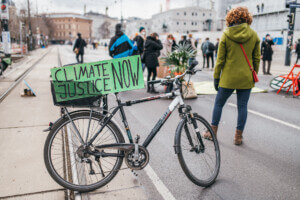This week, the Seattle City Council passed historic legislation that sets a new precedent for cities looking to slash their carbon footprint; signed into law by Seattle Mayor Bruce Harrell. Council members Lisa Herbold, Teresa Mosqueda, and Dan Strauss posited Council Bill (CB) 120718 which “regulates greenhouse gas emissions in larger existing nonresidential and multifamily buildings; establishing and imposing greenhouse gas emissions intensity targets and reporting requirements,” the new bill says. The new ordinance also prescribes penalties for building owners that fail to meet said benchmarks.
“Growing up in Seattle, I watched as our summers became hotter, our skies smokier, and our weather less predictable,” council member Dan Strauss said in a statement. “Inaction is not an option, and we must urgently combat one of the largest emitters of greenhouse gasses, the buildings we work and live in. We already passed the strongest energy code in the nation to make new buildings more efficient and now, with this policy, we will ensure the buildings already built help address the climate crisis too.”
In Seattle, buildings account for 37 percent of the city’s greenhouse gas emissions. The ultimate goal behind CB 120718 is to help Seattle reach net-zero building emissions by 2050. Seattle’s Office of Sustainability and Environment (OSE) estimates that 4,135 buildings on 3,580 properties will be impacted by the bill. These include 1,650 nonresidential buildings, 1,885 multifamily buildings, and 600 campus buildings.
The bill enacts a new city protocol called Building Performance Emissions Performance Standard (BEPS) which specifically targets existing buildings. Policy analysts estimate that BEPS could reduce building emissions by 27 percent and reduce Seattle’s total core emissions by roughly 10 percent.
Seattle Mayor Bruce Harrell introduced the legislation this summer and transmitted it to the City Council last month following the formation of a select committee on climate action. In short, BEPS will require owners of existing buildings larger than 20,000 square feet to take measures that incrementally reduce their building’s greenhouse gas emissions. BEPS is performance-based, meaning that owners can choose what investments make sense at their unique property as long as the established benchmarks are met.
CB 120718 builds on previous initiatives the Seattle City Council has taken. In 1992, the body passed a resolution that recognized the crisis global warming presented. In 2011, the City Council passed a resolution that established a goal for Seattle to reach net-zero greenhouse gas emissions by 2050. Two years later, the Council adopted the 2013 Seattle Climate Action Plan which set forth specific strategies to achieve that target.
In August 2019, Seattle City Council endorsed a Green New Deal program that seeks to eliminate all climate pollutants in Seattle by 2030. Shortly after, an ordinance was passed establishing the Green New Deal Oversight Board to provide guidance on the City’s actions. Seattle Mayor Jenny Durkan then issued Executive Order 2020-01, otherwise known as Advancing a Green New Deal for Seattle, in January 2020.
In another mandate, Seattle officials are working on decarbonizing the 650 buildings under municipal ownership.
“Passing this legislation is one of the most important steps the City can take right now to tackle our local climate emissions,” said council member Mosqueda. “Paired with the record investments we are making with Jumpstart Green New Deal funding to shore up the resilience of our local communities and workforce, this policy will strengthen the City’s climate response and show strong leadership on local climate action. While there’s still so much left to do to advance climate justice, today we should all celebrate passage of this landmark policy.”











